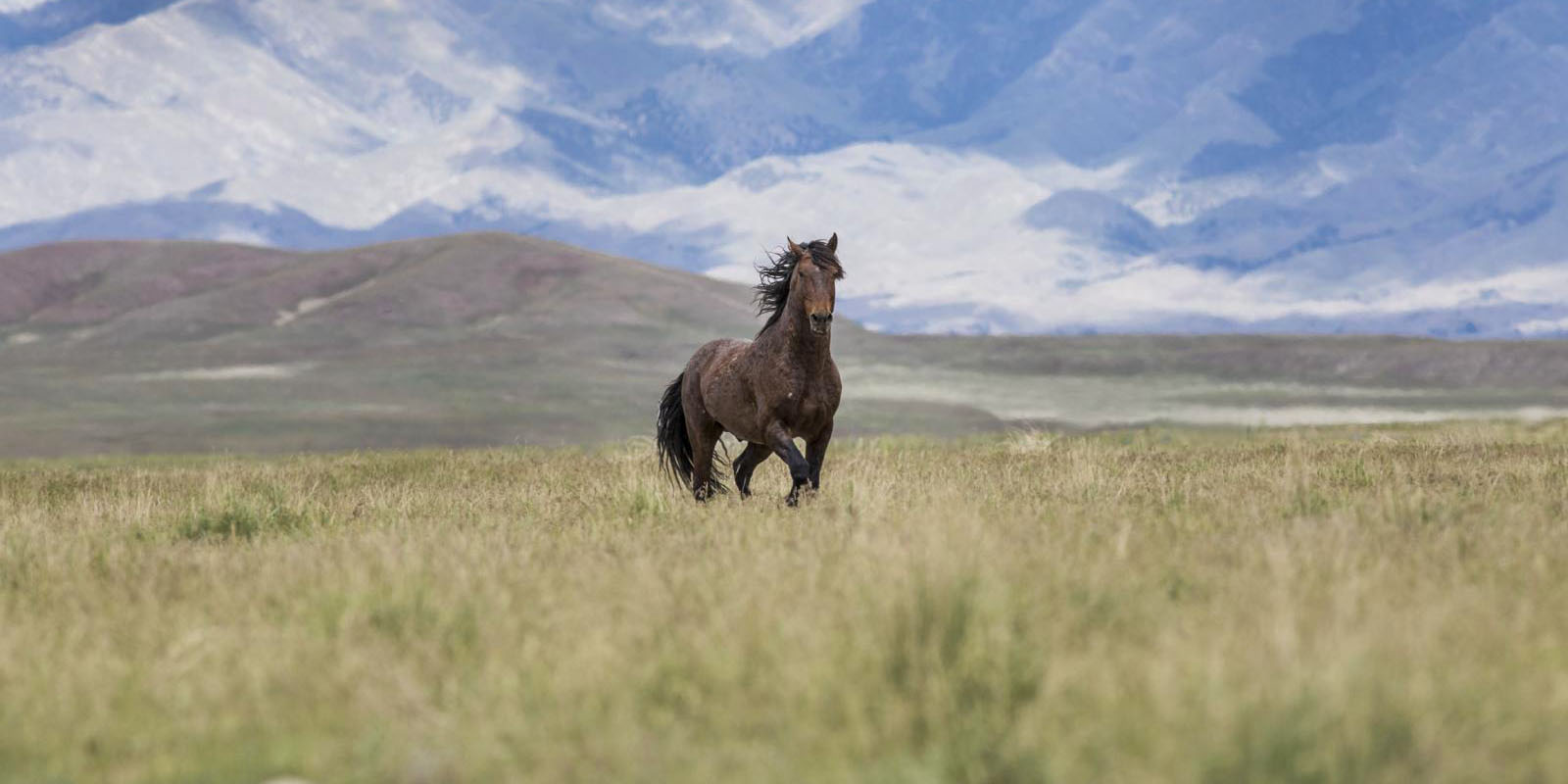July 1, 2019
Last August in Wyoming’s Red Desert, across approximately 700,000 acres of public land federally designated as a wild horse habitat, the Bureau of Land Management conducted what it refers to as a “wild horse roundup.” Using low-flying helicopters, government employees chased wild horses away from their high desert homes and into captivity. For miles upon miles, in the grueling summer heat, the horses fled the helicopter, only to be corralled into crowded pens — leaving their freedom behind them in a cloud of dust.
During this particular high-speed chase, a foal was unable to keep up with his mother as their herd fled in terror. Over the miles and the heat, he was exhausted. It was 94 degrees outside, legal to conduct the capture by only one degree. Eventually, his mother realized he was no longer at her side, and so she bravely turned back to find him. When a wrangler circled back for the pair, the mother valiantly faced off against the helicopter to defend her baby, who had at that point stopped moving altogether.
Both eventually were captured. The mother was led away from her bone-tired foal and into the trap. With no energy left to run away, the foal was lassoed and led into the crowded corral.
The next morning, the tiny black foal was dead. He was curled into a tiny heap on the bare dirt. An observer was told he’d been checked out by a vet, doused with water because he was clearly overheated, and then essentially left to die.
This isn’t an isolated case. It isn’t even rare. Roundups like this happen across the western range, including Nevada, summer through winter each year. Thousands of horses are chased violently by helicopters into captivity in already overcrowded corrals to await a fate that, even in 2019, could end in slaughter. Perfectly healthy mustangs, young and old and all ages in between are susceptible to injury, illness and death due to the brutal, unnatural tactics involved in capturing them by the thousands. It’s literally shocking.
During the Red Desert roundup last August, 10 horses died, six of which were tiny foals. Several perished from what’s known as “capture myopathy” — death by extreme stress or exertion. Translation: They were run to death. Others died from broken limbs. The horses were just babies.
In Nevada, the first roundup of the year begins July 8 in the Triple B Herd Management Area. They’ll chase and capture 800 wild horses. And — to the shock and outrage of many Americans — we pay for this with our taxes. The American Wild Horse Campaign works to change these cruel and inhumane policies and hold the BLM accountable. There is a better way, with proven methods to preserve and humanely manage our nation’s iconic wild horse populations.
While the justification of wild horse roundups will never be acceptable, needless deaths for the most vulnerable like this case in the Red Desert can be significantly reduced. For starters, veterinarians stationed on-site at the roundups should be provided with emergency "foal kits," which include a small nasogastric tube and funnel, electrolytes, and milk replacer to help counteract myopathy. This suggestion actually originated with an animal and plant health inspection service vet reporting after a roundup in Oregon last summer. Likewise, since millions upon millions in taxes already pay for umpteen yearly wild horse roundups, the least the BLM could do is offer a basic wellness protocol while they’re at it. Foal kits, for instance, are packed with essential supplies to prevent foals from suffering and death, and they cost just a few hundred bucks.
Stories such as this one shouldn’t be common, but until we demand change, broken government policy deems wild horse deaths as normal. Foals shouldn’t die this way, but they do. The public needs to know the gory details at the end of their tax dollars, and they need to know they can do something to change the fate of our great symbols of freedom — America’s wild horses.
We ask the American people to join the AWHC in reforming this entire inhumane program that brutally subjects wild horses to trauma and strips them of their freedom, if not their lives. With another season of roundups just days away, we’ll be watching the BLM’s actions and will demand humanity from the agency allocating our dollars and the treatment of the majestic mustangs of the American West.
Jennifer Caudill is a writer and animal welfare advocate with the American Wild Horse Campaign. She can be reached at [email protected].
Originally posted by Reno Gazette-Journal


